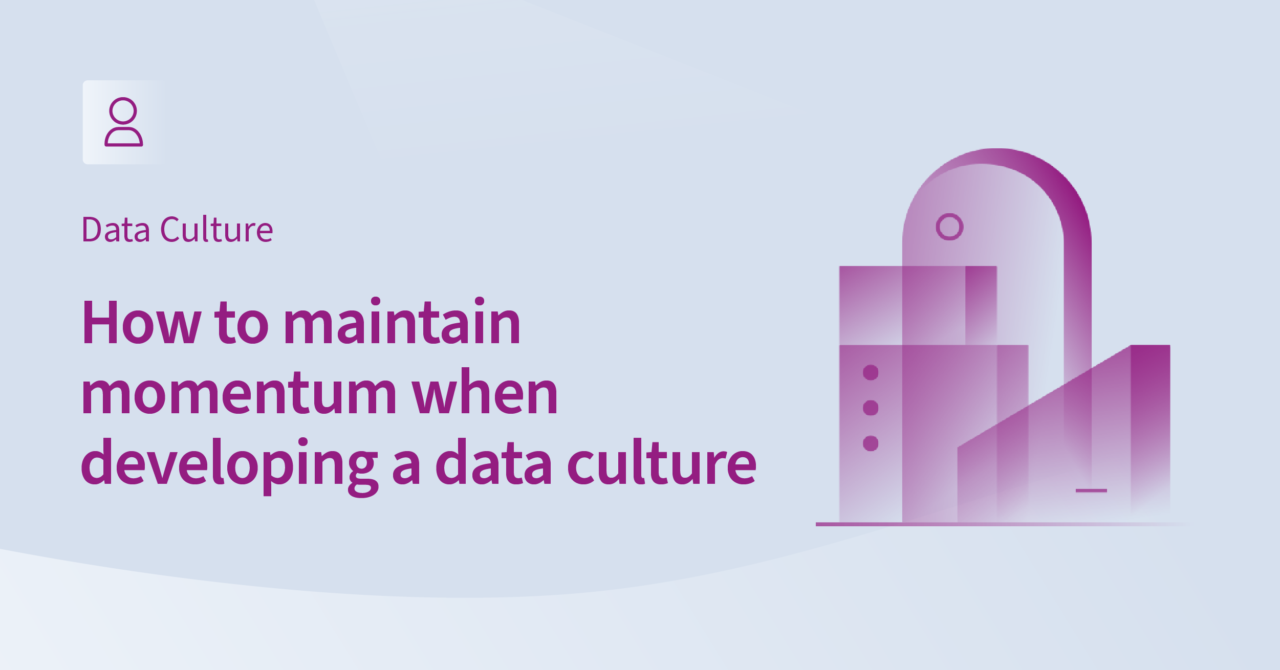How to maintain momentum when developing a data culture

A growing group of organisations across a wide range of industries are embracing data and the behaviours that make it a central and rewarding part of everyday business. Beyond this however, the value of data can only not be ignored but it is a modern business imperative to avoid stagnation and lose relevance regardless of industry.
Developing a data-enabled culture then is key not only unlocking data’s true growth but in ensuring that businesses can tackle the challenges that the future present on stable ground.
Data culture means the integration of data, insight and the experience of work. But building culture doesn’t happen overnight. An organisation must first create an environment that encourages processes and practices that allow a culture to flourish. Individual behaviour needs to change in order for a data culture to take root.
Whilst developing a data culture is not a short or easy journey, it is worthwhile. There will inevitably be wrong turns and bumps in the road, but by maintaining momentum, organisations can keep on track, build a data culture and reap the substantial rewards.
Building a data culture does not mean simply giving an adequate level of data literacy training increasing dashboard engagement but rather empowering a workforce to use data to make better decisions.
The right type of investment
For data culture to take hold, it must be ingrained in all members of an organisation. Every internal stakeholder regardless of position must be able to see, feel and act within an environment that is informed by data and within which they are comfortable.
Vital to individual behaviour change is investing time and resources in a concerted and thoughtful manner. Central to this is training, as all members of an organisation must learn about data. There should also be an investment in environments that facilitate accelerated learning and development of all things relating to data, such as in Innovations Labs.
Without investment, organisations will struggle to overcome the problems that can be encountered when, for example, they try to scale AI throughout an organisation. Correctly allocating resources from early on in the journey is integral to building a data culture.
Maintaining momentum
A robust data culture will help an organisation to overcome many of the problems it faces when it seeks to implement large scale programmes, such as trying to scale AI.
Often, when an organisation attempts to implement organisation-wide change, there will be a surge of enthusiasm at implementation before it drops off. This leads to the programme failing to deliver on its promise. The organisation suffers and might choose not to embark on these sorts of projects again. Competitors gain an advantage as a result.
To mitigate this and maintain momentum, organisations should follow a couple of simple rules when seeking to integrate large scale programmes:
- Solutions must be integrated into the work, with training and development being at the heart of this integration. For example, when it comes to improving the way people use data and analytics tools, instead of asking what training people need, it’s better to ask “what opportunities exist for data and insight to help people do something meaningful as part of their everyday experience of work?”
- When working to build a data culture, an organisation should focus on observable behaviours to power discovery and the design of meaningful interventions. By understanding which behaviours exist and to what degree, behavioural change can be measured over time. We call this an organisation’s “Data Pulse”, and measuring it is powerful for two reasons:
- To track the existence of a data culture in an organisation at any point in time.
- To obtain measurable evidence of the interventions that increased data adoption, giving AI and analytics meaning for all members of an organisation.
Dynamic, not static
When developing a data culture, it’s vital to understand that there is not really an end goal. As the old cliche goes, data culture isn’t a destination, but a journey. It isn’t a one-stop-shop and there is no silver bullet. Rather, in order to create something of significance, it needs to be ongoing and be truly embedded within an organisation.
There are clearly ‘data wins’ to be had along the way and not least of all in terms of increased engagement with data and analytics tooling and therefore improved adoption rates of data transformation and enablement programmes.
This is why having a ‘Data Pulse’ is so important, as it offers an up to date snapshot of the current data climate at an organisation. Culture does not pause. You may be able to change the behaviours, and this will change the culture, but those behaviours will need constant updating over time as the data landscape evolves. Organisations must be dynamic when building a culture as this will be the foundation stone upon which long term results are built.
By being dynamic and open to change, an organisation can maintain momentum over the long term and deliver a robust data culture that delivers results.